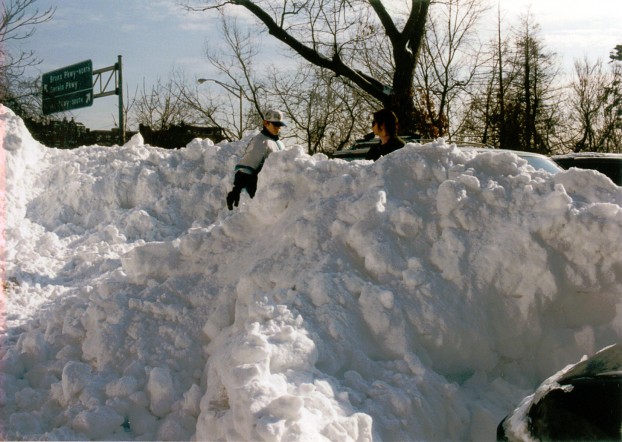Tips on Helping Your Personal Finances Survive the Deep Cold
Record-breaking low temperatures in the Midwest and Eastern United States have had a big impact on the economy. By one estimate, the deep freeze could cost the U.S. economy up to $5 billion. That’s because the extreme cold has forced natural gas and gasoline pipeline operators to reduce flow, prompted school closures, slowed business at stores and restaurants, and grounded thousands of domestic and international flights. And not only have these disruptions hurt the economy and productivity -- they’ve also affected Americans’ personal finances.

From higher heating costs to travel delays -- the cold snap can have a direct impact on your wallet. To help ensure that your financial situation doesn’t worsen because of the cold, we’ve explored five ways that freezing temperatures can impact your personal finances and offered some tips on how to cope.
Higher heating bills
Perhaps the most direct impact on consumers’ pocketbooks from the extreme cold will be felt when they receive the heating bill. To cut costs, consider sleeping with heavier blankets, wearing more sweaters, and using a programmable thermostat to turn the heat down when you’re out of the house or asleep. Use cold water to do laundry and rinse dishes.
The easiest way to cut down on a heating bill is, of course, lowering the thermostat. The Energy Department says turning your thermostat back 10-15 degrees for 8 hours can save you 5-15 percent a year on your heating bill.
You might also want to consider insulating pipes that move hot water or lowering your water heater temperature. The Energy Department says that if your water heater temperature is set too high you can waste anywhere from $36-$61 annually in heat lost from the heater into the surrounding basement area and more than $400 in losses due to water demand.
In addition, check your furnace filters and clean or replace them to keep your furnace operating efficiently. And install or upgrade your attic insulation, caulk and weather-strip drafty windows and doors, and open your drapes during the day to let warmth in and close them at night to keep the warmth inside.
Flight cancellations
A flight cancellation can really throw you for a loop and impact the rest of your travel plans. If your flight has been cancelled because of bad weather, the airline must get you on the next available flight -- but they aren’t obligated to put you on another airline. The very first thing you should do if your flight is cancelled is call your carrier.
If you’re already at the airport, get in line at the gate desk. While you’re waiting in line, call your airline’s customer service number and wait to speak to a representative. Maybe you will get through to someone on the phone before you even reach the front of the service kiosk line.
If you’re active on Twitter, tweet about your situation and be sure to tag your carrier. Some airlines monitor Twitter for customer service issues. .
If you know that your flight could potentially get cancelled due to bad weather, check your airline’s website and call your carrier. Right now many airlines are offering flexible policies for customers delayed by the inclement weather.
School cancellations
Snow days can be fun for kids -- not so much for working parents who have to scramble to find child care help. That’s why it’s important for parents to come up with a plan before the bad weather hits. Among the options parents might consider: telecommuting for the day, getting help from friends and relatives, reaching out to a fellow parent, or taking the day off. Also, keep a list of potential babysitters who might be able to help you out in a tight situation.
Getting sick
Keep yourself healthy by taking the proper precautions. Dress warmly and layer your clothes. Drink warm liquids and stay hydrated. Stock up on supplies that you might need so you can avoid leaving the house in really bad weather conditions. That includes things like drinking water, canned food, prescription drugs, and batteries. When shoveling or walking in snow, avoid straining yourself.
Eat a good meal before shoveling and give yourself frequent breaks so you don’t overexert yourself. Also, watch out for signs of frostbite, which can occur within minutes when unprotected skin is exposed to cold temperatures. It starts with a prickly or itchy sensation. Your skin will then turn red, white, pale or a grayish yellow and start to feel firm or waxy. Remember to protect your pets, too.
Car troubles
Cold weather can make driving tricky and irritating. In extreme cold and icy situations, it’s important to take extra precautions so that you don’t get into car trouble. Follow these steps to avoid any auto issues:
- Unplug your phone or anything draining energy because car batteries lose their strength when temperatures get colder.
- Warm your key with a match or later if your lock freezes.
- Drive with a full tank in case you experience car trouble or get stuck in traffic. Your tank should at least be half full to avoid gas line freeze-up.
- Keep essentials in your car -- like a blanket, flashlight, ice scraper, small bag of abrasive material, booster cables, protective clothing -- in case you get stuck. Also, make sure your phone is fully charged in case you need to call for help on the road.
- Modern cars need only 15-30 seconds of running time before heading out, but AAA recommends warming your vehicle for at least 5-10 minutes so that the oil and engine can warm up.
- Don’t turn your wipers on until they’re clear of ice and snow.
Related Stories:
Buying a Home During the Winter: What You Need to Know
How to Use Social Media to Get Effective Customer Service

